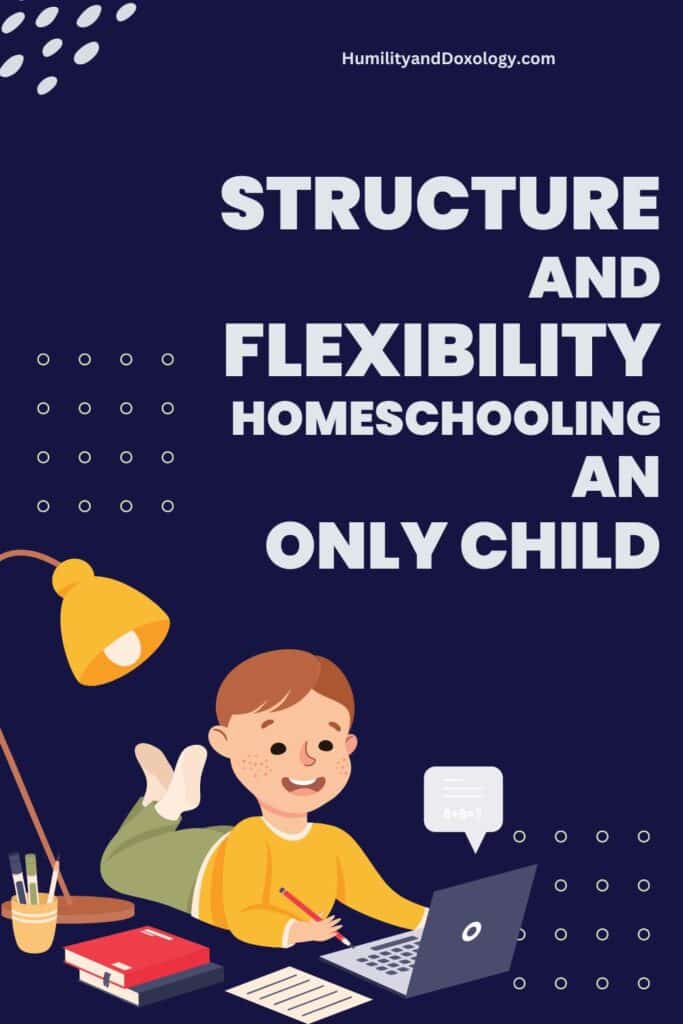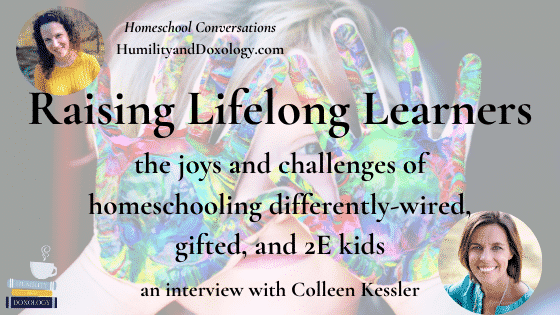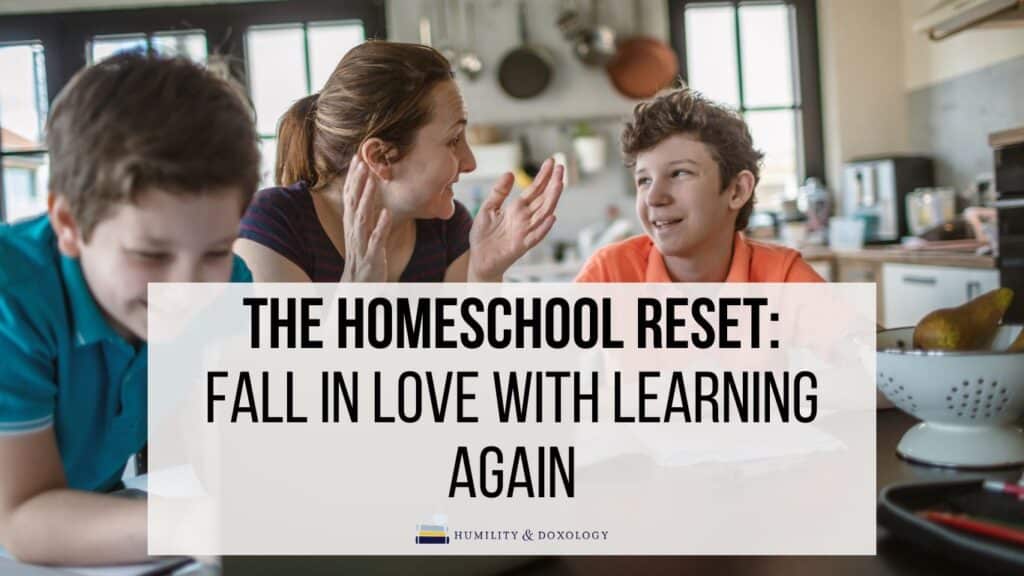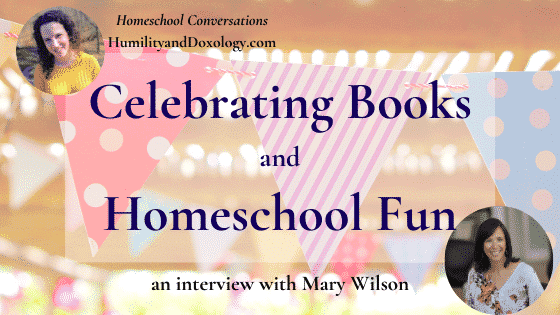Y’all know I’m passionate about the idea that homeschooling can combine both structure and flexibility, especially as we nurture the unique, individual learners in our homes. Today’s guest post offers a captivating glimpse into Laura’s journey nurturing her gifted son’s education. Delve into her eclectic approach (which seamlessly blends structured learning with the freedom to pursue passions) and discover how personalized, one-on-one instruction ignites academic growth and fosters a lifelong love of learning. You’re sure to be encouraged as Laura shares her family’s homeschooling adventure, guided by patience, intuition, and the belief that education is a holistic experience tailored to each child’s unique needs.

{This post contains paid links. Please see disclaimer.}
- The Power of Personalized, One-on-One Instruction
- Eclectic Homeschooling: Blending Academics and Child-Led Learning
- The Dance Between Rigor and Whimsy
- Structuring Our Days With Flexibility
- The Assessment Continuum
- Socialization and the World as Our Classroom
- Reflections on Growth
- Advice for Aspiring Homeschoolers
- Meet Laura from Monkey and Mom
- You may also enjoy:
Balancing Structure and Flexibility in Homeschooling an Only Child | An Eclectic Approach
by Laura from Monkey and Mom
Eight years ago, I found myself at a crossroads as I observed my son amidst his preschool peers. It wasn’t the chaotic energy of the room that struck me, but his thoughtful, deliberate nature amidst it—a stark contrast to the environment designed to cater to the average, not the individual.
A conversation with his teacher, who half-jokingly remarked, “You taught him too much,” coupled with my previous observation became the catalyst for our homeschooling journey. It was clear that the traditional path wouldn’t work for us. This realization was not about defiance but about honoring my son’s inherent curiosity and need for depth.
Eight years into our journey, the path we’ve carved has been both challenging and immensely rewarding. We chose to do something you don’t often see in homeschooling, where many parents chose the academic path or the unschooling path. We chose something uniquely ours: blending structured learning with the flexibility to pursue passions.
The Power of Personalized, One-on-One Instruction
A hallmark of our eclectic approach is the ability to provide truly personalized, one-on-one instruction tailored to my son’s unique needs and interests.
Numerous studies highlight the profound benefits of this individualized attention. Pane et al.(2017) found students receiving one-on-one or small-group instruction experienced significant academic gains compared to traditional classroom settings.
Additionally, Walkington and Bernacki (2018) revealed personalized learning environments improved motivation, engagement, and self-regulated learning skills.
In our homeschool, this personalized approach has manifested in myriad ways. From tailoring the pace and depth of instruction to my son’s level to seamlessly integrating his evolving interests into our curriculum, every aspect of his education has been carefully crafted to nurture his strengths and address his areas for growth.
Furthermore, the bond and trust cultivated through our close educational partnership have fostered an environment where my son feels empowered to ask questions, express doubts, and explore concepts without fear of judgment or peer pressure.

Eclectic Homeschooling: Blending Academics and Child-Led Learning
Imagine trying to fit a star into a square hole—that’s what putting my son into a conventional educational setting felt like. I am sure many of you relate to this.
So, we chose homeschooling with a twist. We chose a different path, one less trodden, where academics and child-led exploration dance together in harmony and aren’t mutually exclusive.
This eclectic approach has been our compass, guiding us through a world where learning is found between the pages of a textbook but also woven into the very fabric of our daily lives.
What do I mean by this? To understand it, we’ll have to define some terms.
Eclectic homeschooling combines various educational styles tailored to each child’s unique needs, interests, and pace. This approach involves selecting effective methods and discarding others through ongoing adaptation.
Student-led learning shifts the focus from teacher to student, granting them autonomy over content, pace, methods, and evaluation. This fosters critical thinking, problem-solving, and self-directed learning skills.
Academic learning in eclectic homeschooling is defined as more traditional, focusing on structured knowledge acquisition in core subjects through textbooks, workbooks, or online resources. It emphasizes systematic learning and assessment to provide a foundational intellectual framework for more personalized educational exploration.
In this blend, the threads of traditional subjects like math and language arts interlace with the vibrant colors of my son’s interests—science, technology, and whatever else catches his inquisitive eye. This approach is about fostering a lifelong love of learning, an invaluable trait associated with greater academic motivation and success.

The Dance Between Rigor and Whimsy
One of the biggest challenges for us has been striking the right balance between providing enough academic structure and allowing flexibility to explore his evolving interests and passions. It’s been an ongoing dance.
My guiding approach has been to prioritize core academic subjects like math and reading (for the skills they provide), while remaining open and adaptable to follow his curiosities when they emerge. This has sometimes meant deviating from my original lesson plans to dive into a new topic that really captured his imagination and enthusiasm in that moment.
It requires me to stay highly attuned to his needs, interests, and learning tendencies so I can nimbly integrate his passions alongside the structured academics in a cohesive way.
For example, when he showed an early keen interest in chemistry, I had to first shore up his math skills to provide the strong foundation needed to eventually explore chemistry concepts in-depth.
Providing academic rigor gives him the tools and knowledge base to then freely pursue his specific areas of interest and go as deep as his curiosity takes him. It’s about balancing the frameworks of fundamental learning with the flexibility to follow his driving inquisitiveness in the moment.

Structuring Our Days With Flexibility
While our days don’t follow a rigid, minute-by-minute schedule, we do have a flexible routine that prioritizes core academics while leaving plenty of open space to freely explore topics that spark his interest in the moment.
Our foundation is built on language arts and math – key subjects for developing critical thinking and problem-solving abilities. Science is another core focus area given his longtime passion for it. Having this baseline structure centered on essential skills allows us the flexibility to then go off on deep dives into whatever is really capturing his curiosity at the time, whether that’s an immersive week studying microbiology or breaking down the algorithms behind Rubik’s cube solutions.
This balance of framework and flexibility lets us prioritize building solid competencies over just checking boxes. It facilitates deep, engaged learning versus surface-level exposure. The spontaneous detours allow his natural enthusiasm for subjects to take the lead while the anchoring academics provide the substantive knowledge and skills to fuel those passionate endeavors.
This integrated approach combining structured lessons with student-directed exploration has paid off. Not only has it kept his innate love of learning alive and thriving, but he’s also soared into the 98th and 99th percentiles on standardized tests. It’s enabled him to accelerate rapidly in certain subjects too, like math where he’s now working four grade levels ahead of his peers.

The Assessment Continuum
Evaluating progress in our homeschool isn’t just about formal tests, although those do play a role. It’s an ongoing, organic process of observation and adjustment. We take a dual approach, combining formal academic assessments with the informal insights I continuously gather by closely observing his engagement levels and comprehension in the moment – another benefit of homeschooling an only child since I can devote all my attention to him. One example of this was when I noticed a gap in his understanding of the Earth’s layers as we watched a documentary together.
This dual evaluation method allows me to pinpoint areas where he may be missing key knowledge or skills. With that awareness, I can then adapt our lessons and learning activities to systematically fill those gaps, creating a cohesive and comprehensive educational journey tailored to his needs.
While standardized tests provide an objective benchmark of his academic performance, it’s the everyday hands-on explorations and passionate projects where I really see his evolving interests and competencies shine through. This constant cycle of formal and informal assessment ensures the learning experience remains optimally aligned with his current levels, abilities, and curiosities.
Socialization and the World as Our Classroom
The socialization question always looms large when it comes to homeschooling. Since I’m homeschooling an only child, I knew this aspect would require conscious nurturing on my part. And what an enriching adventure it’s been!
For us, socialization hasn’t just meant socializing with peer groups, although he does get that interaction through activities like chess club, robotics team, and science camps. It’s been about engaging with people of all ages and backgrounds who share common interests and passions in all areas of life.
Our family travels have also been an invaluable part of his socialization and education. The gift of experiencing diverse cultures and global perspectives first-hand has shaped a worldly awareness and deep appreciation for our environment that can’t be learned from books alone.

Reflections on Growth
Our homeschooling journey has been utterly transformative – for my son, of course, but also for me as his guide. It’s cultivated incredible patience, attunement, and trust in the power of child-led intuitive learning within me.
More than anything, it’s reaffirmed that education is truly a holistic experience that happens everywhere, not just at a desk, while also solidifying my belief that the academic foundational skills are a must if you wish to see clear academic progression.
Our lived experiences have crystallized my belief that blending rigorous academics with passionate personal exploration is not just possible, but creates the most engaging and effective educational model.
Advice for Aspiring Homeschoolers
For parents considering homeschooling, remember – your journey will be unique. Don’t feel pressured to emulate any one particular path or philosophy. Weave in the structure and components that feel right, but remain open to diverging in whichever ways best nurture your child’s distinct passions and curiosities.
Eclectic homeschooling provides a vast, customizable canvas limited only by your imagination and your child’s interests. Listen carefully to your child, trust your instincts as their guide, and you’ll find that sweet spot where spontaneous exploration interplays beautifully with foundational academics. The rewards of this balanced voyage will be deeply felt.
Meet Laura from Monkey and Mom

Laura is a European homeschooling mom and the creator of the blog Monkey And Mom. For over 7 years, she has been educating her gifted son at home using an eclectic approach that emphasizes flexibility and creativity. Her blog offers a wealth of resources, tips, and fun printables for parents navigating similar educational paths. Laura’s insights are invaluable for anyone homeschooling an only child or seeking fresh educational ideas.




